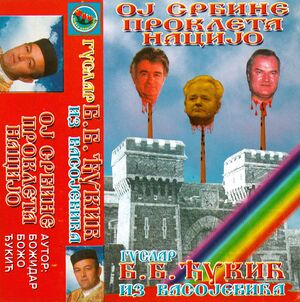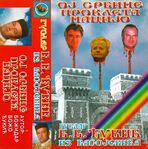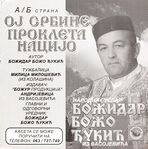Oj Srbine prokleta nacijo: Difference between revisions
(You ever work on another article, only to find more information on another article? Yeah... That just happened.) |
m (→Release: minor fix) |
||
| Line 23: | Line 23: | ||
==Release== | ==Release== | ||
''Oj Srbine prokleta nacijo'' was released in | ''Oj Srbine prokleta nacijo'' was released in 2001 by Đukić's label, Božur Produkcija. It is one of three self-released albums without a catalog number and the most recent release from Đukić before his death. | ||
In 2006, an academic paper titled "[https://www.researchgate.net/publication/215586105_Novo_guslarstvo_Newly_singing_to_the_accompaniment_of_the_gusleBalkan_music_instrument Novo guslarstvo]" would use the album as well as Đukić's previous work, ''[[Pogibija Pavla N. Bulatovića - ministra vojnog]]'' as examples of Gusle works published post-war. | In 2006, an academic paper titled "[https://www.researchgate.net/publication/215586105_Novo_guslarstvo_Newly_singing_to_the_accompaniment_of_the_gusleBalkan_music_instrument Novo guslarstvo]" would use the album as well as Đukić's previous work, ''[[Pogibija Pavla N. Bulatovića - ministra vojnog]]'' as examples of Gusle works published post-war. | ||
Revision as of 06:11, 17 May 2024
| Ој Србине проклета нацијо | ||||
|---|---|---|---|---|
 | ||||
| Single album by | ||||
| Released | 2001 | |||
| Genre | Gusle | |||
| Label | Божур Продукција | |||
| Гуслар Б. Б. Ђукић chronology | ||||
| ||||
Oj Srbine prokleta nacijo (Serbian Cyrillic: Ој Србине проклета нацијо, lit. "Oh Serbs, Cursed People") is the twenty-second single by guslar Božidar Đukić, released some time in 2001, by Božur Produkcija. It is the last known single by Đukić before his passing in 2009. It is notable for its shocking cover art.
Background
On the 27th of May 1999 in the midst of the NATO bombing campaign, the International Criminal Tribunal of the former Yugoslavia would issue a warrant for president Slobodan Milošević and four others.[1] After the bombing campaign, protests against SFRY president Slobodan Milošević would begin starting in July of the same year.
On the 10th of January the following year, a coalition formed between sixteen democratic parties known as the Demokratska opozicija stranke (Serbian Cyrillic: Демократска опозиција странке, lit. "Serbian Opposition Party", abbr. DOS) with intentions to overthrow Milošević. The DOS would win following the election in late September, though their victory was annulled on the 4th of October.[2][3] Despite this, Milošević resigned shortly after before a second election could take place. While most modern sources misattribute his resignation during the Bulldozer Revolution (5th or 6th of October),[4][5][6] contemporary sources say that he formally resigned on the 7th with Koštunica taking his place.[7][8] On the 17th of November, Koštunica welcomed the idea of opening a branch of the ICTY in Belgrade with the possibility of arresting Milošević.[9] On the 25th of December, the DOS party leader and prime minister Zoran Đinđić promised an arrest for the former president.[10]
On January 2001, concerns regarding a conflict of interest arose when officials also expressed their interest in hosting the tribunal on domestic soil[11] along with comments regarding Koštunica's meeting with Milošević and statements to the press.[12][13] Despite this, Yugoslavian authorities seemed to continue to cooperate with international authorities as they too were building a case surrounding corruption-based charges.[14] On the 23, the Hague would reissue Milošević's warrant with hopes that Koštunica would oblige, though he did not with talks of extraditing Milošević falling through the same day.[15][16] Twelve days later, on the 4th of February, Đinđić announced that the ICTY gave Belgrade until the end of March to hand over Milošević. Unlike Koštunica who was no longer interested in extraditing Milošević, Đinđić was optimistic and cooperative with this ultimatum.[17] Nine days later on the 13th, official authorities stated that police were ready to detain Milošević and on March 20th, nearly a month later, U.N. officials were updated as a former colleague of Milošević said that other former colleagues were aiding in building a case against Milošević.[18] Five days later on the 25th, Yugoslav authorities were fully cooperating with the Hague.[19] As the deadline approached, police would surround the Milošević residence on March 30th.[20] The standoff lasted for about 36 hours and Milošević was arrested on the 1st of April.[21][22] While a bill was introduced to amend a law preventing Milošević's extradition in late March,[23] Koštunica would reverse his stance on extraditing the former president, supporting the bill about three months later.[24] By the 21st of June, Yugoslav officials were preparing to extradite Milošević following pressue from the U.N. and Đinđić would also talk with a U.S. ambassador on the matter on the 27th.[25][26] A day later, Đinđić issued orders to the police to extradite Milošević, ignoring the law and Koštunica. The operation was done in secret with the cooperation of NATO.[27][28]
Release
Oj Srbine prokleta nacijo was released in 2001 by Đukić's label, Božur Produkcija. It is one of three self-released albums without a catalog number and the most recent release from Đukić before his death.
In 2006, an academic paper titled "Novo guslarstvo" would use the album as well as Đukić's previous work, Pogibija Pavla N. Bulatovića - ministra vojnog as examples of Gusle works published post-war.
Track listing
| No. | Title | Length |
|---|---|---|
| 1. | "Ој Србине проклета нацијо" |
| No. | Title | Length |
|---|---|---|
| 1. | "Ој Србине проклета нацијо" |
Personnel
Writing
- БОЖИДАР БОЖО ЂУКИЋ- Аутор
Production
- "БОЖУР ПРОДУКЦИЈА" АНДРИЈЕВИЦА ИЗ ВАСОЈЕВИЋА- Издавач
- БОЖИДАР БОЖО ЂУКИЋ- Главни и одговорни уредник
Miscellaneous
ТУЖБАЛИЦА МИЛИЦА МИЛОШЕВИЋ (ИЗ КОЛАШИНА}
Tape variants
- Great audio quality
References
- ↑ The Hague. "President Milosevic and Four other Senior Fry Officials Indicted for Murder, Persecution and Deportation in Kosovo". icty.org. 27 May 1999. Retrieved 16 May 2024.
- ↑ Boško Nicović. "Hronologija: Od kraja bombardovanja do 5. oktobra". b92.net. 4 October 2010. Archived from the original on 26 August 2012. Retrieved 16 May 2024.
- ↑ "Yugoslavia annuls election result". CNN.com. 4 October 2000. Archived from the original on 18 December 2002. Retrieved 16 May 2024.
- ↑ October 6 2000 CE – Slobodan Milosevic Resigns as President of Serbia. mapsoftheworld.com. Retrieved 16 May 2024.
- ↑ "2000: Mass Demonstrations in Belgrade Lead to Slobodan Milošević’s Resignation". history.info. 2023. Retrieved 16 May 2024.
- ↑ "2000: Milosevic quits, street celebrations continue". BBC.co. 2005. Retrieved 16 May 2024.
- ↑ Steven Erlanger. "SHOWDOWN IN YUGOSLAVIA: THE OVERVIEW; MILOSEVIC CONCEDES HIS DEFEAT; YUGOSLAVS CELEBRATE NEW ERA". New York Times. 7 October 2000. Archived from the original on 16 May 2024. Retrieved 16 May 2024.
- ↑ "Kostunica sworn in as president of Yugoslavia". CNN.com. 7 October 2000. Archived from the original on 28 October 2002. Retrieved 16 May 2024.
- ↑ Andrea Koppel. "Yugoslavia 'opens way for Milosevic trial,' says U.S. official". cnn.com. 17 November 2000. Archived from the original on 27 April 2003. Retrieved 16 May 2024.
- ↑ "Djindjic: Milosevic will be pursued". CNN.com. Archived from the original on 10 October 2003. Retrieved 16 May 2024.
- ↑ "Milosevic trial may visit Serbia". CNN.com. 5 January 2001. Archived from the original on 17 October 2003.
- ↑ "Kostunica meets Milosevic". CNN.com. 13 January 2000. Archived from the original on 06 April 2003. Retrieved 16 May 2024.
- ↑ "Kostunica defends meeting with Milosevic". CNN.com. 15 January 2001. Archived from the original on 20 August 2003. Retrieved 16 May 2024.
- ↑ "Milosevic faces crackdown". CNN.com. 21 January 2001. Archived from the original on 06 April 2024. Retrieved 16 May 2024.
- ↑ "Arrest warrant re-issued for Milosevic". CNN.com. 23 January 2001. Archived from the original on 6 April 2003. Retrieved 2024.
- ↑ "Abrupt end to Milosevic extradition talks". CNN.com. 23 January 2001. Archived from the original on 6 April 2003. Retrieved 16 May 2024.
- ↑ "Serbia given Milosevic deadline". CNN.com. 4 February 2001. Archived from the original on 29 April 2003. Retrieved 16 May 2024.
- ↑ "Yugoslav police set to seize Milosevic". CNN.com. 20 March 2001. Archived from the original on 1 May 2003. Retrieved 16 May 2024.
- ↑ "Del Ponte welcomes Belgrade move". 26 March 2001. Archived from the original on 1 May 2003. Retrieved 16 May 2024.
- ↑ "Police surround Milosevic home". CNN.com. 30 March 2001. Archived from the original on 1 May 2003. Retrieved 16 May 2024.
- ↑ "Timeline: Milosevic arrest". CNN.com. 2 April 2001. Archived from the original on 1 May 2003. Retrieved 16 May 2024.
- ↑ "Milosevic arrested". BBC.co. 1 April 2001. Retrieved 16 May 2024.
- ↑ "Del Ponte welcomes Belgrade move". CNN.com. 26 March 2001. Archived from the original on 1 May 2003. Retrieved 16 May 2024.
- ↑ "Milosevic nearer to extradition". CNN.com. 14 June 2001. Archived from the original on 24 June 2001. Retrieved 16 May 2024.
- ↑ "U.N. renews Milosevic plea". CNN.com. 21 June 2001. Archived from the original on 12 July 2001. Retrieved 16 May 2024.
- ↑ "Milosevic stalls extradition move". 27 June 2001. Archived from the original on 7 July 2001. Retrieved 16 May 2024.
- ↑ "Milosevic extradited". BBC.co. 28 June 2001. Retrieved 16 May 2024.
- ↑ "Serbian Tells of Spiriting Milosevic Away". New York Times. 1 July 2001. Archived from the original on 18 July 2012. Retrieved 16 May 2024.



